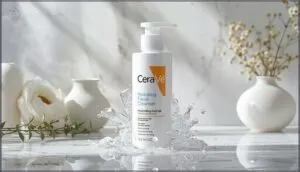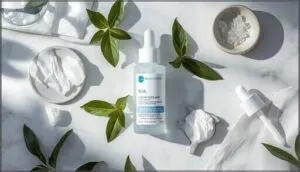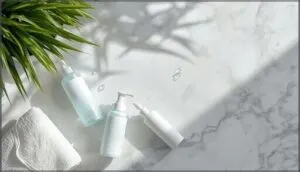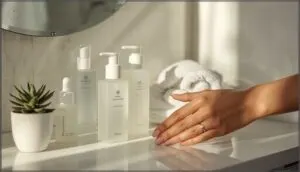This site is supported by our readers. We may earn a commission, at no cost to you, if you purchase through links.

Studies show fragrance can drop your skin’s protective function by 86%, leaving you vulnerable to irritation, redness, and chronic sensitivity. Even products labeled “unscented” aren’t always safe—they often contain masking agents that trigger the same reactions.
If your skin’s been acting up despite your best efforts, the culprit might be hiding in plain sight. Switching to a fragrance-free skin care routine isn’t about sacrifice—it’s about finally giving your skin what it actually needs to heal.
Table Of Contents
Key Takeaways
- Fragrance ingredients can weaken your skin’s protective barrier by up to 86% and hide under vague labels like “parfum,” which legally conceals up to 24 unlabeled compounds that trigger irritation and allergic reactions.
- Switching to fragrance-free products benefits everyone—not just sensitive skin—by preserving natural ceramides, reducing water loss, and allowing your skin barrier to recover from chronic inflammation.
- Start your fragrance-free transition by swapping high-exposure products first (cleanser and moisturizer), since 63% of cleansers and 68% of moisturizers contain hidden allergens that contact your skin multiple times daily.
- Most skin improves within 7-14 days of eliminating fragrance, but severe reactions need 4-6 weeks of consistency, and “unscented” doesn’t mean safe—many still contain masking agents that irritate skin.
Why Fragrance-Free Matters for Skin Health
You’ve probably heard that fragrance-free is better for your skin, but let’s be honest—most people don’t really know why. The truth is, fragrance isn’t just about smell; it’s one of the sneakiest culprits behind irritation, redness, and even allergic reactions you can’t quite pin down.
Here’s what you need to understand about how fragrance messes with your skin and where it’s actually hiding in your products.
How Fragrance Affects Sensitive and Reactive Skin
When your skin reacts to fragrance, it’s not being dramatic—it’s sounding an alarm. Here’s what happens to sensitive and reactive skin when fragrance sneaks in:
- Your skin barrier weakens, dropping protection by up to 86% after perfume use
- Allergic reactions flare up in roughly 2% of the population through contact allergies
- Skin irritation strikes women twice as often as men
- Risk factors multiply if you’ve got eczema or asthma
Fragrance sensitivity affects a significant portion of the population, with 8-15% facing issues.
Hidden Fragrance Components in Skincare
Here’s the kicker: 74% of product labels hide fragrance ingredients under “parfum” or “fragrance”—that’s a massive regulatory gap. Some deodorants pack 24 unlabeled compounds! Even worse, “unscented” doesn’t mean fragrance-free—masking agents neutralize smells while still triggering skin irritation. These “unscented” products may contain masking agents to conceal odors.
With allergen prevalence affecting up to 9% of people globally, these labeling loopholes create real health implications you can’t see coming.
Key Benefits of a Fragrance-Free Routine
You might think skipping fragrance is just for people with super sensitive skin, but here’s the thing—everyone benefits. When you ditch those hidden irritants, your skin gets a real chance to calm down and do its job properly.
Let’s break down the three biggest wins you’ll notice when you make the switch.
Reducing Skin Irritation and Allergic Reactions
When fragrance is the culprit, ditching it can seriously calm your skin down. Studies show roughly 30% of Americans react to scented products, and clinical testing reveals fragrance allergens trigger reactions in about 23% of contact dermatitis patients. That’s huge!
Ditching fragrance calms irritated skin fast—studies show 30% of Americans react to scented products, with fragrance allergens triggering nearly a quarter of contact dermatitis cases
By choosing fragrance-free skincare routine products, you’re prioritizing allergy prevention and irritation relief—giving your sensitive skin care the break it desperately needs for real barrier repair.
Supporting The Skin Barrier Function
Beyond just calming irritation, going fragrance-free actually helps protect your skin barrier—your body’s first line of defense. Here’s how it works:
- Ceramide importance: Fragrance-free products preserve your skin’s natural ceramides, which hold moisture in and irritants out
- TEWL reduction: You’ll lose less water through your skin, keeping it plump and hydrated
- Lipid supplementation: Quality fragrance-free moisturizers replenish protective lipids your barrier needs
- Microbiome stability: Your skin’s good bacteria thrive without fragrance disruption
- Barrier recovery: Damaged skin heals faster when you remove fragrance from your skin care routine
Clinical data shows fragrance-free skincare routine products greatly improve barrier function, especially for sensitive skin care needs—lowering water loss and boosting those key ceramide levels.
Suitable for All Skin Types
You might assume fragrance-free skincare is only for sensitive skin, but here’s the truth: it offers universal suitability across diverse demographics. Whether you’re dealing with oily, dry, or combination skin—at any age—fragrance-free products work beautifully.
They’re gender-neutral, family-friendly, and safe for everyone from infants to grandparents.
Reading ingredient labels helps you build a smart, inclusive skincare routine that actually protects your skin barrier.
Essential Steps to Detox Your Skincare
You don’t have to throw out your entire medicine cabinet overnight—that’s overwhelming and honestly unnecessary. The smartest move is to tackle the products you use most often first, since they’re the ones touching your skin day in and day out.
Let’s start with the heavy hitters that’ll give you the biggest payoff when you swap them out.
Prioritizing High-Exposure Swaps (Cleansers, Moisturizers)
Want to see the fastest results? Start where fragrance hits your skin most often. Here’s your game plan:
- Swap your cleanser first – 63% contain hidden allergens, and you’re using it twice daily on damp, vulnerable skin
- Replace your moisturizer next – dermatologist recommendations point here since 68% harbor irritants that sit on your face for hours
- Check for sneaky fragrance allergens – even “unscented” products can pack botanical extracts that trigger sensitive skin impact
These high-exposure swaps deliver the biggest payoff in your fragrancefree skincare routine.
Building a Gentle Fragrance-Free Routine
Now that you’ve cleared out the irritants, it’s time to rebuild your routine with products that actually respect your skin. The good news? You don’t need a complicated ten-step system—just a few solid, fragrance-free essentials that work together without causing drama.
Let’s walk through the building blocks: a gentle cleanser, a smart exfoliant, and the moisturizers and extras that’ll keep your skin happy.
Choosing The Right Cleanser (e.g., CeraVe Hydrating Facial Cleanser)
Your cleanser is the first defense in your fragrance-free skincare routine—so choose wisely. A gentle cleanser like CeraVe Hydrating Facial Cleanser checks all the boxes: ceramides to reinforce your skin barrier, hyaluronic acid for hydration benefits, and zero irritating fragrance.
Over 90% of dermatologists recommend fragrance-free options for sensitive skin, and gentle formulas like this one prove why gentle skin cleansing matters.
Selecting Safe Exfoliants (e.g., Paula’s Choice BHA Liquid Exfoliant)
Exfoliants can be a revelation—or a total disaster—depending on what you pick. Paula’s Choice BHA Liquid Exfoliant is a wonderful fragrance-free option with 2% salicylic acid that unclogs pores without triggering skin irritation. Here’s what makes it work:
- Low BHA concentration (1-2%) suits most skin types
- Patch testing prevents allergic surprises
- Start with once-weekly exfoliant frequency
- Check formulation ingredients for hidden irritants
- Build skin tolerance gradually over weeks
Your fragrance-free skincare routine deserves smart, gentle exfoliation.
Moisturizers, Toners, and Body Care Options
Fragrance-free moisturizers, toners, and body care options are exploding thanks to consumer demand—market growth hit $6.1 billion in 2024. Clinical data shows these products slash irritation for sensitive skin while supporting product safety. CeraVe and Eucerin deliver reliable moisturizer choices, while fragrance-free toners restore pH balance without sabotaging your skin barrier.
| Category | Top Pick | Key Benefit |
|---|---|---|
| Moisturizer | CeraVe Hydrating | Ceramides + niacinamide |
| Toner | Alcohol-free options | pH restoration |
| Body Care | La Roche-Posay Lipikar | Long-lasting hydration |
Maintaining and Optimizing Results
You’ve built your fragrance-free routine—now it’s all about keeping your skin happy for the long haul.
If you’re still dealing with redness, breakouts, or irritation after a few weeks, don’t just tough it out. Let’s talk about when to call in a pro and how to stay fragrance-free without making it your full-time job.
Consulting a Dermatologist for Persistent Issues
If you’re dealing with persistent irritation that won’t quit—even after switching to fragrance-free products—it’s time to see a dermatologist. They bring diagnostic accuracy and can tailor treatment adjustments to your unique skin. Here’s why it matters:
- Patch test and allergy testing pinpoint hidden cosmetic allergy triggers causing skin irritation
- Referral urgency ensures severe reactions get specialized care fast
- Access barriers are shrinking with teledermatology options available now
Long-Term Tips for Avoiding Fragrance Exposure
After you’ve got your routine down, protect your progress by thinking bigger than just skincare. Home air quality matters—ditch scented candles and air fresheners.
At work, advocate for fragrance-free policies if occupational exposure is triggering flare-ups. Master ingredient label reading on everything, from laundry detergent to hand soap.
Policy advocacy is growing, and your voice counts in pushing for better product labels and skincare ingredient awareness.
Frequently Asked Questions (FAQs)
Can fragrance-free products still have a scent?
Yes, they can. Natural odors from active ingredients or masking agents in product labels might create a scent.
Manufacturing impact and ingredient scents differ from hidden fragrances—unscented doesn’t always mean odorless.
How long until skin improves without fragrance?
Your skin generally starts calming down within 7-14 days after ditching fragrance. Severe reactions might need a month or more.
Individual variation plays a role—continued exposure delays healing, so stick with your Fragrance-Free skincare routine!
Are essential oils considered fragrance in skincare?
If it walks like a duck and talks like a duck—well, essential oils are fragrance. They’re packed with VOC composition, IFRA-regulated allergens like limonene, and irritants.
Natural doesn’t mean safer, despite labeling issues.
Do fragrance-free products cost more than regular ones?
Choosing fragrance-free products doesn’t automatically mean premium pricing. While ingredient sourcing and manufacturing costs influence market demand, many affordable options exist.
Cost transparency in skincare helps you find budget-friendly fragrance-free skincare products.
Can I transition gradually or go cold turkey?
Honestly, going cold turkey with fragrance-free skincare is like ripping off a bandage—quick but potentially harsh.
Gradual benefits shine here: swap products one-by-one to minimize skin irritation, adjustment side-effects, and product reactions, especially if you’ve got sensitive skin.
Conclusion
Your skin doesn’t lie—when it reacts, it’s telling you something’s wrong. Switching to a fragrance-free skin care routine isn’t complicated, but it’s life-changing. You’ve learned how to read labels, swap products strategically, and protect your barrier from hidden irritants.
Now comes the easy part: consistency. Give your skin 4-6 weeks to reset, and watch redness fade, sensitivity calm, and resilience return. Your face will thank you—quietly, without the drama.
- https://cosmoderma.org/perfumes-and-associated-allergens-a-brief-review/
- https://pmc.ncbi.nlm.nih.gov/articles/PMC8247875/
- https://www.verifiedmarketreports.com/product/fragrance-free-skin-care-products-market/
- https://www.bayoucitydermatology.com/post/why-dermatologists-recommend-fragrance-free-skincare-products
- https://www.futuremarketinsights.com/reports/sensitive-skin-solutions-market









